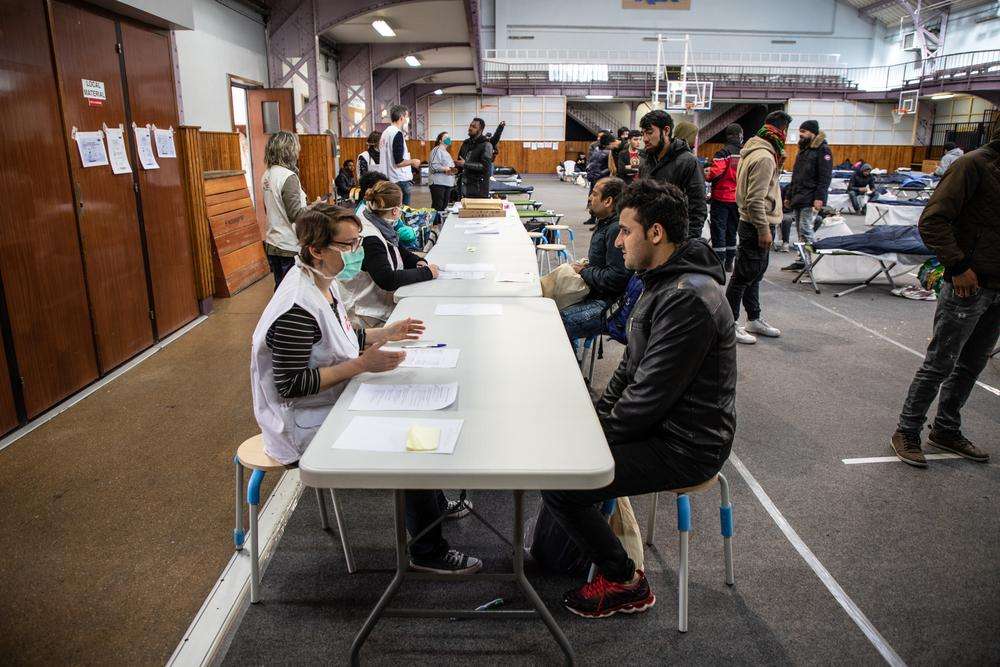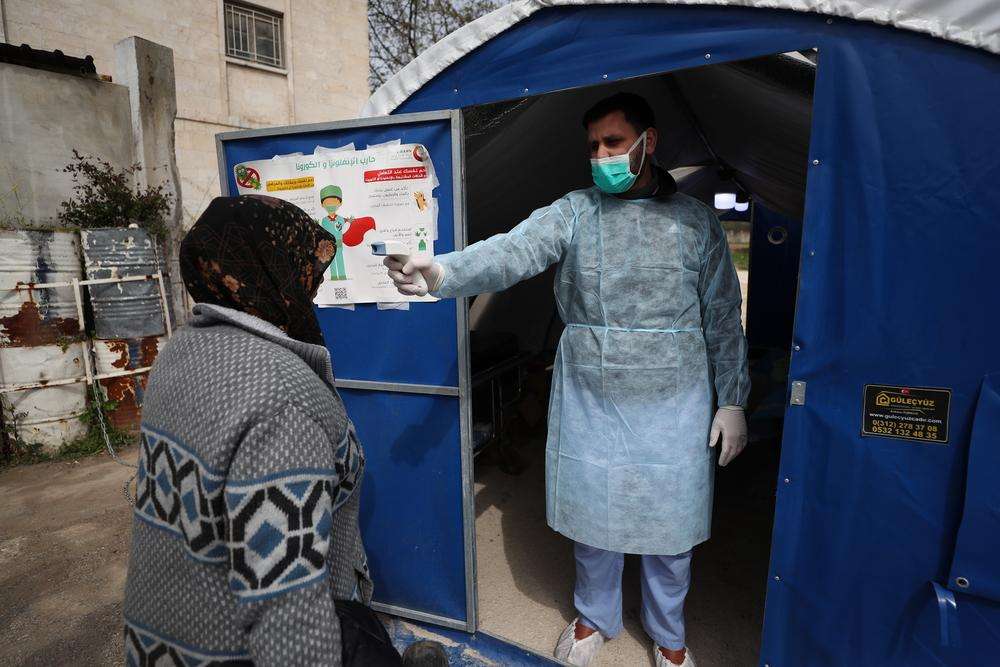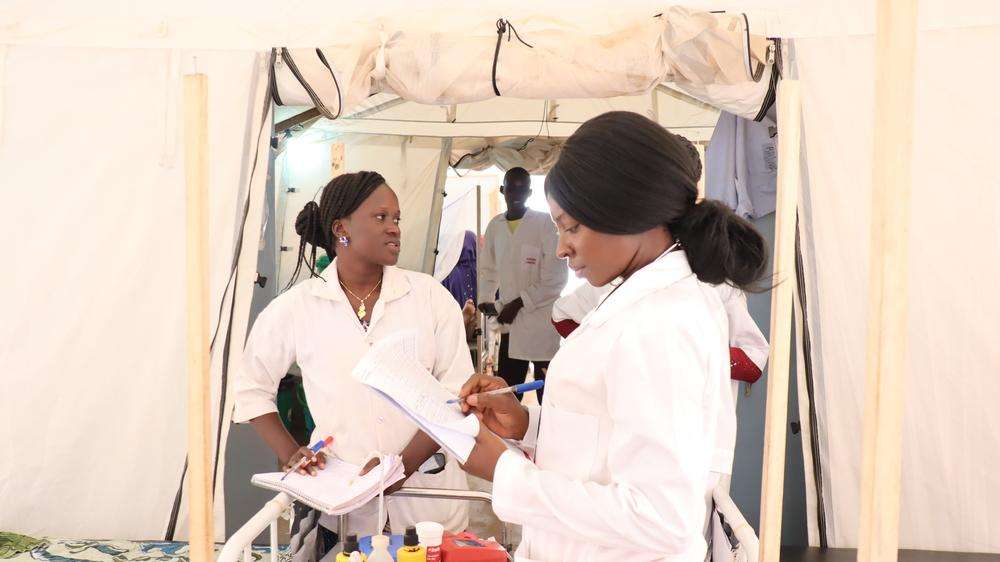Doctors Without Borders/Médecins Sans Frontières (MSF) teams are racing to respond to the coronavirus pandemic in the more than 70 countries where we run existing programs, while opening projects in new countries as they become outbreak hotspots.
MSF’s response to COVID-19, the disease caused by the new coronavirus, focuses on three main priorities: Supporting health authorities to provide care for patients with COVID-19, protecting people who are vulnerable and at-risk, and keeping essential medical services running.
Across our projects, MSF teams are improving infection prevention and control (IPC) measures to protect patients and staff and slow the spread of the coronavirus. Strengthening IPC measures is absolutely crucial to protect health workers and patients, both in COVID-19 care centers and in all other facilities providing vital health services, in order to avoid amplifying the pandemic or being forced to shut down.
Health systems worldwide are in urgent need of personal protective equipment (PPE) so that essential medical services can stay open. The global shortage of PPE is the reality for health workers in most countries where we work, who routinely face shortages of crucial items such as masks, aprons, and testing equipment. Reliable access to protective equipment, to COVID-19 tests, to oxygen, and to drugs for supportive care will only become more urgent as COVID-19 spreads in countries with little access to medical tools.
Caring for patients with COVID-19
In the US and Europe, which are currently the epicenters of the pandemic, MSF’s response focuses on improving care for the most vulnerable and at-risk communities, such as elderly people in nursing homes, homeless people, and migrants living in precarious circumstances. Among these groups, mortality rates have sometimes reached extraordinary and shocking levels.
“In our visits to nursing homes, we always note a lack of basic protective equipment and a lack of screening for frontline workers and potentially infected residents,” says Caroline De Cramer, MSF medical adviser for our programs in Belgium. “It is important to test nursing home residents as quickly as possible. They are extremely vulnerable because they are doubly at risk, due to their age and their communal living conditions.”
In São Paulo, Brazil, MSF teams provide medical consultations and help identify cases of COVID-19 among homeless people, migrants, refugees, drug users, and the elderly, referring patients in more serious condition to hospitals.
In Spain, Italy, Belgium, and France—all currently pandemic hotspots—we also support several hospitals that have been overwhelmed by the number of COVID-19 patients. Depending on the specific needs, our support ranges from advice and training on infection prevention and control methods to setting up wards for patients recovering from COVID-19 and for patients with moderate symptoms of the disease.
MSF also cares for patients in dedicated COVID-19 facilities in Burkina Faso, Democratic Republic of Congo (DRC), Cameroon, Ivory Coast, Mali, and Pakistan. We are preparing dedicated COVID-19 facilities in Kenya, Lebanon, Niger, Philippines, Senegal, Syria, and Yemen, among other places. These facilities will treat patients with moderate to severe forms of COVID-19, including those who suffer from acute respiratory problems.
We’re also sending an oxygen production unit to Burkina Faso, which will be able to produce oxygen in large quantities for several dozen patients at the same time. Patients with severe COVID-19 symptoms often suffer from hypoxia (low oxygen levels in body tissue) and need extra oxygen. Providing patients with sufficient oxygen without the use of invasive techniques in places where there is little intensive care capacity is a key challenge.
In most countries where we already run programs, such as Colombia, Iraq, and Nigeria, we are opening dedicated wards inside health facilities to help keep COVID-19 patients separate from uninfected patients and to extend hospitals’ capacity to provide care.
“The initial goal of our response is to help hospitals handle suspected or confirmed COVID-19 patients, to make sure they are welcomed and treated as well as possible under the circumstances, and to prevent their further spreading the virus to patients or staff,” says Shaukat Muttaqi, MSF head of mission in Iraq, where we are supporting hospitals in Mosul, Baghdad, and Erbil.
Similar activities are being carried out around the world. In the Haitian capital, Port-au-Prince, MSF has reconfigured an existing emergency care center to isolate and refer patients suspected of having COVID-19. In Tanzania’s Nduta refugee camp, where MSF is the main health care provider for 73,000 Burundian refugees, we are building triage and isolation areas in health clinics and in the main MSF hospital where patients with suspected COVID-19 will be referred. In Bangladesh, where nearly a million Rohingya refugees live in sprawling camps across Cox’s Bazaar district, we have built dedicated COVID-19 wards and isolation rooms in our field hospitals. This ongoing work will add 300-bed capacity.
Empowering people to protect themselves and reduce transmission
Worldwide, the response to COVID-19 has relied heavily on large-scale lockdowns of populations and physical distancing measures, with the aim of reducing transmission and preventing health systems from becoming overwhelmed. But for people dependent on daily activities for their survival, such as day laborers and those living in precarious or overcrowded settings, self-isolation and lockdowns are not realistic. In some places, hundreds of thousands—sometimes even millions—of people live in difficult and dangerous conditions, without any social safety net. It is crucial to provide people with the means to protect themselves and others.
“Most recommendations for protecting people against the virus and slowing down its spread simply cannot be implemented in Idlib [province],” says Cristian Reynders, field coordinator for MSF operations in northwestern Syria. “How can you ask [homeless] people to stay at home to avoid infection? We are talking about almost one million displaced people—at least one-third of Idlib’s total population—most of whom live in tents in camps. They no longer have homes.”
To help people protect themselves, MSF teams run health promotion activities in practically all of our projects, so that people understand the steps they can take to reduce their chances of contracting COVID-19 and to stop the further spread of the coronavirus. Where possible, we are distributing soap and setting up water points so people can regularly wash their hands. These measures, and additional assistance such as the provision of reusable cloth masks, are even more crucial for people at risk of developing serious complications, including elderly people and those living with other diseases, such as diabetes, hypertension, cancer, HIV, or tuberculosis (TB).
For example, in Uzbekistan, our health promotion activities include specially tailored messaging on TB and COVID-19 for TB patients and their families. In South Africa, MSF has reassigned existing staff from all four of our projects to our COVID-19 response. They are now working to limit the spread of the infection through contact tracing (both in-person and over the telephone) and the development and dissemination of health promotion materials. Teams are also assisting vulnerable asylum seekers and elderly homeless people to mitigate the impact of the national 21-day lockdown.
In Liberia, MSF teams are distributing soap. In the Malian capital of Bamako, where there have already been confirmed cases, and in camps from Syria to Mexico and Nigeria to Greece, we are setting up water points for hand-washing and clean drinking water.
In Burkina Faso, Ivory Coast, Mali, Niger, and South Africa, MSF has started producing cloth masks for use in the community. These locally made cloth masks, while not the same as those required by medical staff, can help prevent transmission of the virus if used appropriately and as long as handwashing and physical distancing are observed as much as possible.
Keeping essential services running
Suddenly faced with huge numbers of new patients, many countries’ already fragile health systems can quickly collapse under pressure from this pandemic, with disastrous consequences. If medical care were to falter, then common childhood killers like measles, malaria, and diarrhea, would go untreated. Other essential services MSF provides, such as sexual and reproductive health care, emergency room services, maternity and surgical wards, and treatment of patients living with HIV or TB, would go unmet. This would have a terrible impact on the people we serve and would surely increase the number of deaths.
In the hundreds of health facilities MSF works in around the world, our teams are rolling out infection prevention and control measures and reorganizing services to prevent transmission. For example, consultations have been reformatted to maintain safe distances between patients. Hospitalization wards have been redesigned to allow enough space between each bed. Health facilities now have separate patient pathways to divert those with suspected COVID-19 away from others. In Niger, rather than having large numbers of people visiting health centers to be checked for possible malaria, MSF community health workers go into communities to help provide this service. And in Kenya, MSF has adapted the way we care for people with HIV by providing patients with three-month prescriptions for antiretroviral drugs so they can come to health centers less frequently. In South Africa, our teams are ensuring patients suffering from HIV/TB co-infection get medication refills delivered straight to their homes.
Across the world, from Cameroon and DRC to El Salvador, Nigeria, Sudan, and Yemen, MSF teams are training and supporting local health authorities on infection prevention and control methods, and on the detection and triage of patients with COVID-19 to prevent health facilities from becoming amplifiers of the pandemic.
“Continuing our medical activities in areas already facing massive health needs is an absolute priority for MSF,” explains Albert Viñas, MSF emergency coordinator for Cameroon. The COVID-19 outbreak in Cameroon poses an additional challenge for a country marked by violence that has displaced hundreds of thousands of people. “COVID-19 activities require extra resources, staff, and materials in a situation where the global movements of people and goods has become very, very difficult. Our teams are working around the clock to maintain our regular lifesaving activities while responding to this new outbreak.”
Unfortunately, some projects have been suspended as a result of new restrictions linked to COVID-19, such as MSF’s pediatric surgical program in Liberia, which received some of the country’s most critical surgery cases. The project was suspended as a result of travel restrictions imposed to limit the spread of the COVID-19, making it impossible to replace our international pediatric surgeon who left at the end of March.
We have also been forced to suspend some non-vital activities, such as elective surgery, and reorganized others to reduce the risks for patients and staff. For example, in Pakistan, we have put our cutaneous leishmaniasis treatment services on hold as a temporary measure to avoid the spread of COVID-19. In Jordan, MSF’s reconstructive surgery hospital for war-wounded people from across the Middle East continues to care for 170 patients, but has stopped new admissions for surgery for the time being.
Despite these constraints, MSF teams in all countries where we work are striving to find ways to keep doing as much of our lifesaving work as possible while adapting to the multiple and serious challenges of the coronavirus pandemic.








